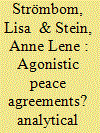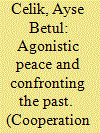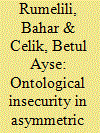|
|
|
Sort Order |
|
|
|
Items / Page
|
|
|
|
|
|
|
| Srl | Item |
| 1 |
ID:
187033


|
|
|
|
|
| Summary/Abstract |
Later years have seen the growth of a vibrant theoretical discussion on agonistic peace and the importance of creating space for contestation, plurality, and dissensus post-accord. However, there has been very few attempts at embedding agonistic theory in empirical analyses of peace agreements. This study attends to that lacuna by investigating how agonistic principles can be integrated and investigated in peace agreements. We suggest a threefold set of indicators for assessing the degree to which peace agreements are invested with agonistic dynamics: (1) what types of spaces for interaction are offered post-accord; (2) what forms of inclusion are stipulated; and (3) how is the peace agreement framed in terms of conflict termination and consensus/dissensus? We illustrate how the various indicators could be put into motion in concrete analyses applying them to examples from the Oslo Accords, the Belfast Agreement, and the Colombian Peace Agreement. Finally, we discuss four dilemmas and problematiques of integrating agonistic ideas in peace agreements; the issue of power, the mixing of agonistic and liberal ideals in peace agreements, the principle of ‘nothing is agreed until everything is agreed’ and the related double-edged potential of constructive ambiguity and finally the challenges of implementing peace agreements.
|
|
|
|
|
|
|
|
|
|
|
|
|
|
|
|
| 2 |
ID:
178176


|
|
|
|
|
| Summary/Abstract |
This study analyzes how peace processes in socio-political environments that do not support ‘confronting the past’ (CTP) initiatives are affected by the exclusion and delegitimization of alternative narratives different from dominant ones concerning the nature and history of ethnic conflicts, focusing on Turkey’s failed peace process as a case study. It pays specific attention to the resistance against acknowledging alternatives to dominant narratives by considering the role played by bystanders and antagonistic citizens, who are not directly part of the conflict but nonetheless support it by remaining passive or directly/indirectly supporting dominant narratives. Driven by agonistic peace theory, the article shows how failing to turn these groups into agonistic citizens through some form of agonistic CTP initiative and allowing a space for alternative narratives can result in the fragility of efforts towards a transition to peace.
|
|
|
|
|
|
|
|
|
|
|
|
|
|
|
|
| 3 |
ID:
154746


|
|
|
|
|
| Summary/Abstract |
This article contributes to the recent literature on ontological security in conflict studies by empirically investigating, through a case study of Turkey’s Kurdish issue, how ontological asymmetry complicates peace processes. Over time, all conflicts become embroiled in a set of self-conceptions and narratives vis-à-vis the Other, the maintenance of which becomes critical for ontological security. In ethnic conflicts, however, these conceptions and narratives also intersect with a fundamental ontological asymmetry, because such conflicts often pit state parties with secure existence against ethnic groups with contested status and illegitimate standing. We argue that peace processes are easier to initiate but harder to conclude in ontologically asymmetric conflicts. Accordingly, we find that during the 2009–2015 peace process in Turkey, ontological (in)security-induced dynamics presented themselves in cyclical patterns of ambitious peace initiatives receiving greater support among the Kurdish public but giving way, at the first sign of crisis, to a rapid and dramatic return to violence, which neither side acted to stem. Moreover, we underscore that ontologically asymmetric conflicts, such as Turkey’s Kurdish issue, are often characterized by a societal security dilemma, where the conditions of ontological security for one party undermine those of the other. Therefore, building consensus around a new shared peace narrative may not be possible or desirable, and a lasting solution to Turkey’s Kurdish issue depends on the development of an agonistic peace around coexisting, multiple and contestatory narratives.
|
|
|
|
|
|
|
|
|
|
|
|
|
|
|
|
|
|
|
|
|